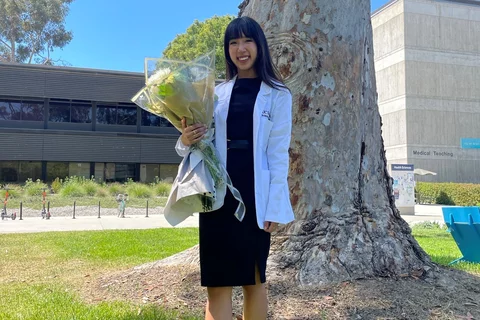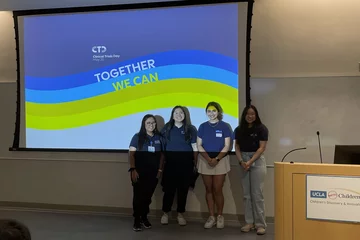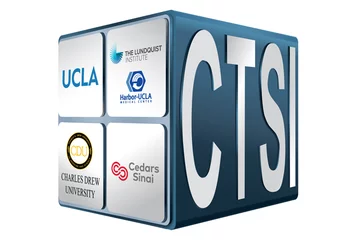The Clinical and Translational Science Institute Research Associates Program (CTSI-RAP) has been serving UCLA Health for over a decade with undergraduate students volunteering in a number of clinical research areas for UCLA faculty and their study teams. Elizabeth Tran joined the program in 2016, graduated in 2019 and has been in ongoing contact with CTSI-RAP leadership, Drs. Laurie Shaker-Irwin as Executive Director and Dr. Noah Federman as Medical Director. Elizabeth entered UCLA with the intent to learn all that she could about research – from translational to clinical - and her career trajectory demonstrates that incredible arc of discovery. As a Microbiology, Immunology, and Molecular Genetics major, she delved into research interests that paralleled the knowledge she was acquiring in her coursework.
We caught up with Elizabeth in an interview as she completes her first year as a medical student at the UC San Diego School of Medicine. In addition to her studies, she works in the UCSD School of Medicine Free Clinic as a Renal Manager, serves as a hospice volunteer, and participates in a Community Fridge program.
A path to medical school filled with research opportunities
Initially, Elizabeth started to serve in the laboratory of Dr. Owen Witte as an undergraduate student researcher, investigating cooperation of the RAF family of kinases to drive metastases in prostate cancer and potential inhibitory CAR T-cell therapy in targeting neuroendocrine prostate cancer. While conducting the basic science research, she joined CTSI-RAP and volunteered on a number of studies. After graduating, she transitioned to a full-time position as a clinical research coordinator on Dr. Leonard Marks’ team, conducting clinical research studies in prostate cancer for three years. These included interventional studies and a cancer imaging project where she served on a multi-disciplinary team evaluating prostate MRI/ultrasound fusion biopsy. Elizabeth’s multi-year undergraduate and post-graduate experiences in the same therapeutic area for an extended period of time are a testament to the power of mentorship for students. This extended exposure in the medical field further reinforced her desire to become a physician.
"All the communication skills and study knowledge that I’ve acquired during my time in this program not only helped illuminate my desire to pursue research but also that I enjoyed medicine and eventually wanted a career in it."
-Elizabeth Tran
Utilizing CTSI-RAP to its fullest and building confidence as an undergrad
While in CTSI-RAP, Elizabeth participated in a number of studies that tested her skills as researcher and a patient confidant. She volunteered with Dr. Holly Middlekauff, a physician scientist, who mentored Elizabeth by providing opportunities to take on increased responsibilities based upon prior success and future growth. These studies assessed the effect of e-cigarettes on cardiovascular disease. She served as the Study Liaison which allowed her to assist in protocol development and experimental design, screen patients, document and collect data, conduct procedures, and participate in team meetings. Elizabeth played an integral role in contributing to poster abstracts and peer-reviewed research publications (see below). She was also invited to present her many projects at the UCLA Undergraduate Research Day event each year. These are events for students to share their research results in a large scientific forum for the UCLA campus and surrounding community. Elizabeth was also a guest speaker at a CTSI leadership meeting where she discussed her research projects, her personal growth and development, and the mentoring process. She engaged the leaders in a conversation clearly conveying the impact of the program on her career journey.
In addition, Elizabeth volunteered on the Undiagnosed Disease Network Study under Drs. Katrina Dipple and Eric Vilain, which sought to bring patients to UCLA for review and evaluation of their rare disease conditions. She assisted patients with clinical visits, including exam preparation, patient itineraries and transport. She organized patient information and responded to patient needs during their week-long stay in Los Angeles. As this study was intermittently scheduled at the Clinical and Translational Research Center, Elizabeth shadowed investigators and nurses on the unit, participating in patient visits. She shadowed Dr. Noah Federman in other busy inpatient and outpatient settings, including the UCLA Pediatric Bone and Soft Tissue Sarcoma Clinic.
Elizabeth is a most inquisitive student and in her daily interactions, demonstrates a genuine interest in the art, science, and practice of medicine She also has a creative side which included her membership on several UCLA dance choreography teams over the years. She has a unique position of being both analytical and creative which are ideal characteristics for a physician. Elizabeth’s extensive volunteer work, shadowing experience within the UCLA Health System and community, and subsequent medical training demonstrates her commitment to better understand the complex issues surrounding medical care access and provisioning.
"The RAP program not only benefits the students - but the program makes wonderful contributions to the research lab as well. Elizabeth was filled with energy and enthusiasm - and she shared that with the research team. She worked hard - and even asked to spearhead a project. As the project leader, she was able to demonstrate her organizational skills, her work ethic, and her ability to work independently and productively. Elizabeth is a gem - I am so glad we were able to work together via the RAP Program!"
-Holly Middlekauff, MD
Elizabeth’s confidence and high-level decision-making skills make her a standout amongst her peers. She was an enthusiastic member of the Recruitment Committee in CTSI-RAP that sought to evaluate and interview hundreds of applicants to select the highest caliber students for the program. Once the new students entered the program, she served as a research mentor to the younger students encouraging them along on their pre-health journey.
Elizabeth’s growth mindset, past experiences and personal challenges have helped her develop a confident awareness of her own self-identity leading her to be passionate about medicine, an advocate for her patients, and a promoter of healthcare access for all.
An Interview with Elizabeth
What drew you to the CTSI Research Associates Program?
There were many positives that drew me to this program. I appreciated the breadth of mentorship not only from the program directors, Dr. Laurie Shaker-Irwin and Dr. Noah Federman but from the respective physician PIs that I had the opportunity to work with, in particular Dr. Holly Middlekauff. There were a variety of clinical trials that students were able to participate in as well. Since the program was also primarily student facilitated, there were plenty of opportunities to cultivate leadership, administrative, and communications skills as well.
How did you choose which research studies to volunteer on?
For me, it was simply by availability and opportunity. Of course, there were usually a handful of studies students may participate in. I did dip my feet into a few trials initially and then found one that particularly stood out to me - in terms of involvement, knowledge, and mentorship - and just stuck with it for my undergraduate career.
What was it like receiving mentoring from Dr. Middlekauff and her team?
Oh it was lovely! I still keep in touch with her. Dr. Middlekauff is a great mentor. She explains difficult topics with patience and eagerness, which I appreciated greatly as a then, starry-eyed awkward undergraduate. If there were opportunities I wanted to pursue, she would help guide me through the trial process and enrollment. It was a wonderful learning experience working with her and her multi-disciplinary team.
What was your personal experience with CTSI-RAP and how did it impact your career?
CTSI-RAP played a pivotal role in my pursual of a clinical research focus in my gap years. It also provided with the necessary skillset and language to traverse the clinical trial realm at UCLA Urology as well. The mentorship I received from Dr. Shaker-Irwin and Dr. Federman were invaluable as well. There were times when I struggled in areas beyond education, and they were there to help keep my energy up. I’m more than grateful for them. My classmates and I learned how to communicate with a diverse group of faculty and students as well. All the communication skills and study knowledge that I’ve acquired during my time in this program not only helped illuminate my desire to pursue research but also that I enjoyed medicine and eventually wanted a career in it.
You now have a portfolio of journal publications, please let us know how you accomplished so much during your undergraduate years and shortly thereafter.
I want to say I was lucky. Right time and place for the opportunities. After that, it was a matter of showing dedication and work to the research you are a part of and expressing interest to your mentors that you want to participate in whatever projects that interested you.
After graduating, you were hired as a clinical research coordinator in Urology. What motivated you to pursue such a role? Which of your many talents, skills, or experience do you believe led the study team to hire you?
A big part of why I pursued this in my gap years was due to CTSI-RAP. I found that I enjoyed clinical research – both the research and patient interaction that is usually characteristic of this type of research. I also had prostate cancer basic science research, so I thought it was a great way to expose myself really to the “bench to bedside” whole picture of prostate cancer. I think aside from my more entry-level research experience gathered from my undergraduate career, the investigators appreciated my eagerness to learn and give to the team my time and effort. I was fortunate to have mentors who were able to give a positive word on my previous involvements with their research teams and organizations.
There have been ups and downs and personal challenges along the way, including COVID. What helped you get through those over the years?
This is a hard one. I believe that through the toughest of times I had support throughout many of my hurdles – be it mentoring physicians, professors that I got close to, friends, family and my apartment’s newly adopted COVID cat. Even when I am at a low in one moment or a long moment, I like to believe that everything ends up working out. I joke about manifestation of positive things a lot these days especially as medical school picks up. One of my close classmates and I have this funny thing before we take an exam in which either one of us will confirm an “amazon order” of passing the test (of course we did study). It’s become a manifestation ritual and honestly, relieves the nerves.
How is your first year of medical school going? Was it all that you expected?
All and more. It is another experience, and a very niche one. It’s funny because you feel like you don’t know anything all over again, like a toddler entering primary school. At the same time, I have learned so much and received a lot of opportunities to meet new amazing people, learn about careers in medicine, and do more research!
Are you conducting any clinical research? If so, what area? If not, do you intend to do so?
Yes. I am working with Dr. Rana McKay now at UCSD. I am still in the preliminary phase of setting up which studies to participate in. Some of the studies include data analysis of blood genetic markers in cancers like prostate and kidney.
Do you have any further advice or encouragement for students early in their medical and research careers?
If you already know what you want to do, that’s amazing! If you don’t that’s also amazing – there’s more for you to explore! I definitely did not think I would end up where I am having started at UCLA with an English major. One advice I want to give (very trite but bear with me) is to don’t be afraid to reach out to “adults” for advice or to learn from them. Maybe out of the 50 emails you sent would be met with a no response, but if you get just one or two, you’re on the right path.
As you know, mentoring is a huge component of RAP success, including RAP leadership (Drs. Federman and Shaker-Irwin), alumni, and within-program mentoring. Do you feel that this contributed to your professional development and, if so, in what ways? Are you currently or do you intend to mentor others in the future?
Yes – 1000%. A lot of the opportunities I received were through my mentors and students, who knew of other opportunities that would perhaps interest me. Networking is huge and I cannot stress it enough. I definitely believe that when you have someone who has been in your shoes or similar, the road becomes a lot less scary. Or simply having someone you respect give you a pat on the back is a great. My mentors in CTSI-RAP helped me grow professionally and socially. As I mentioned above I have received opportunities to conduct research, create and present abstracts, interact with professionals, and consolidate my career path through the experiences I gained from CTSI-RAP members and faculty. I am and intend to mentor in the future as long as I can.
Research Papers:
Kelesidis T, Sharma M, Satta S, Tran E, Gupta R, Araujo JA, Middlekauff HR. Ectodomain shedding of proteins important for SARS-CoV-2 pathogenesis in plasma of tobacco cigarette smokers compared to electronic cigarette vapers: a cross-sectional study. J Mol Med (Berl). 2023 Feb 10:1–9. doi:10.1007/s00109-023-02286-8. Epub ahead of print. PMID: 36759357; PMCID: PMC9911331.
Kelesidis T, Zhang Y, Tran E, Sosa G, Middlekauff HR. Instigators of COVID-19 in Immune Cells AreIncreased in Tobacco Cigarette Smokers and Electronic Cigarette Vapers Compared With Nonsmokers. Nicotine Tob Res. 2022 Feb 14;24(3):413-415. doi: 10.1093/ntr/ntab168. PMID: 34410424; PMCID:PMC8513409.
Kinnaird A, Yerram NK, O'Connor L, Brisbane W, Sharma V, Chuang R, Jayadevan R, Ahdoot M, Daneshvar M, Priester A, Delfin M, Tran E, Barsa DE, Sisk A, Reiter RE, Felker E, Raman S, Kwan L, Choyke PL, Merino MJ, Wood BJ, Turkbey B, Pinto PA, Marks LS. Magnetic Resonance Imaging-GuidedBiopsy in Active Surveillance of Prostate Cancer. J Urol. 2021 Dec 2:101097JU0000000000002343. doi:10.1097/JU.0000000000002343. Epub ahead of print. PMID: 34854746.
Kelesidis T, Zhang Y, Tran E, Sosa G, Middlekauff HR. Expression of Key Inflammatory Proteins Is Increased in Immune Cells From Tobacco Cigarette Smokers But Not Electronic Cigarette Vapers: Implications for Atherosclerosis. J Am Heart Assoc. 2021 Jan 5;10(1):e019324. doi: 10.1161/JAHA.120.019324. Epub 2020 Dec 26. PMID: 33356378;PMCID: PMC7955503.
Kelesidis T, Tran E, Arastoo S, Lakhani K, Heymans R, Gornbein J, Middlekauff HR. Elevated Cellular Oxidative Stress in Circulating Immune Cells in Otherwise Healthy Young People Who Use Electronic Cigarettes in a Cross-Sectional Single-Center Study: Implications for Future Cardiovascular Risk. J Am Heart Assoc. 2020 Sep 15;9(18):e016983. doi: 10.1161/JAHA.120.016983. Epub 2020 Sep 8. 2020 Sep 15. PMID: 32896211; PMCID: PMC7726977.
Haptonstall KP, Choroomi Y, Moheimani R, Nguyen K, Tran E, Lakhani K, Ruedisueli I, Gornbein J, Middlekauff HR. Differential effects of tobacco cigarettes and electronic cigarettes on endothelial function in healthy young people. Am J Physiol Heart Circ Physiol. 2020 Sep 1;319(3):H547-H556. doi: 10.1152/ajpheart.00307.2020. Epub 2020 Jul 31. PMID: 32734819; PMCID: PMC7509270.
Kinnaird A, Sharma V, Chuang R, Priester A, Tran E, Barsa DE, Delfin M, Kwan L, Sisk A, Felker E, Marks LS. Risk of Prostate Cancer after a Negative Magnetic Resonance Imaging Guided Biopsy. J Urol. 2020 Dec;204(6):1180-1186. doi: 10.1097/JU.0000000000001232. Epub 2020 Jul 2. PMID: 32614257.
Arastoo S, Haptonstall KP, Choroomi Y, et al. Acute and chronic sympathomimetic effects of e-cigarette and tobacco cigarette smoking: role of nicotine and non-nicotine constituents. Am J Physiol Heart Circ Physiol. 2020;319(2):H262-H270. doi:10.1152/ajpheart.00192.2020
Ip, M., Diamantakos, E., Haptonstall, K., Choroomi, Y., Moheimani, R. S., Nguyen, K. H., Tran ,E., Gornbein, J., Middlekauff, H. R. (2020). Tobacco and Electronic Cigarettes Adversely Impact ECG Indices of Ventricular
Repolarization: Implication for Sudden Death Risk. American Journal of Physiology-Heart and Circulatory Physiology. 2020 May 1. doi: 10.1152/ajpheart.00738.2019
ACC ABSTRACTS 2020
Theodoros, K., Tran, E., Lakhani, K., Arastoo, S., Heymans, R., Middlekauff, H. Differential Impact of Chronic Electronic Cigarette and Tobacco Cigarette Smoking on Monocyte Activation in Humans. ACC.20 World Conference Congress of Cardiology Virtual; Mar 30. Abstract 203.
Theodoros, K., Tran, E., Lakhani, K., Arastoo, S., Heymans, R., Middlekauff, H. Chronic Electronic Cigarette Users and Chronic Tobacco Cigarette Smokers Have Similar Elevations in Cellular Oxidative Stress. ACC.20 World Conference Congress of Cardiology Virtual; Mar 30. Abstract 204.
Image source: CTSI RAP




